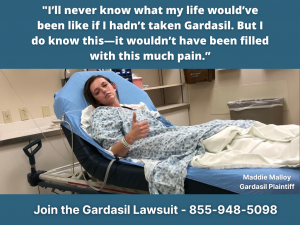Texas Gardasil Lawsuit Alleges HPV Vaccine Causes POTS and Other Injuries
Before Gardasil, Maddie Malloy was a happy and healthy young woman. Now, she'll never know what her life would've been like.
Merck & Co. Inc. (NYSE:MRK)
Plaintiff Madelyn “Maddie” Malloy’s lawsuit against New Jersey-based Merck & Co., Inc. and subsidiary Merck Sharp & Dohme alleges the pharma giant knowingly created a substantial risk of significant harm to individuals who receive the “defective and unreasonably dangerous” Gardasil HPV vaccine. Malloy’s attorneys, Bijan Esfandiari, Michael L. Baum, Stephanie Sherman, Monique Alarcon, and co-counsel Robert F. Kennedy, Jr., are seeking punitive damages against Merck on her behalf.
Baum Hedlund Aristei & Goldman filed the complaint on December 29, 2021 (Case No. 6:21-cv-00506) before the U.S. District Court for the Eastern District of Texas. The national law firm and co-counsel represent others who claim similar injuries after getting the Gardasil vaccine.
“Madelyn’s injuries and ailments after Gardasil are far from unique,” says attorney and shareholder Stephanie Sherman. “Merck has concealed the risks of life-altering injuries from Gardasil for over a decade while raking in billions in profits. We intend to hold them accountable for the harm they have caused.”
Madelyn Malloy was 19 years old when she received her first dose of Gardasil on June 26, 2018. Madelyn’s mother trusted the vaccine would help keep her daughter safe from cancer, something she worried about after losing her mother-in-law to cancer.
Before Gardasil, Madelyn was a happy and healthy young woman who had just completed high school and was looking forward to starting college. She enjoyed playing sports, running, traveling, going on adventures, hanging out with friends, and spending time with her family.
Weeks after receiving the first Gardasil shot, Madelyn experienced periodic lightheadedness and dizziness. Less than two months later, she received her second dose. Her lightheadedness worsened, and she began feeling weak and fatigued.
Madelyn started her first semester of college in the fall of 2018. It took her some time to adjust to her new life. After a few months, she started working out again, running 2 miles a day, lifting weights, and participating in a variety of exercise.
In December of 2018, she received her third Gardasil shot.
Things got worse months later when she returned to her hometown for spring break. On March 3, 2019, Madelyn went out to a restaurant with her sister and grandmother. Within a few minutes of eating, she suddenly felt very sick, she was shaking, unable to swallow, her heart was pounding in her chest and her arms and legs went weak. She felt like she was freezing even though she was sweating. She was taken to the emergency room and was told she most likely had a food allergy attack.
After this scary experience, Madelyn’s doctor told her to always know where the closest emergency room is, prescribed her an epi-pen, and gave her more information on steps to take if she suffers another attack. She was also referred to an allergist for follow up and testing.
On March 18, 2019, Madelyn suffered another attack while eating out at a restaurant with her family. She ended up sick in the bathroom. After taking her prescribed medications, the reaction eventually passed.
Two weeks later, Madelyn was again eating with her family when she began to have another severe reaction. She was having trouble breathing, and after using two epi-pens, her symptoms were not getting better. Madelyn’s parents rushed her to the hospital. She could barely move or walk because her body was so stiff, and she was shaking so badly. Her heart was being over 200 beats per minute, and she couldn’t get comfortable.
While the symptoms eventually subsided and she was released from the hospital, the experiences over the last month scared her. She became terrified of eating anything that would cause her to have another attack. She only ate the same few things for over two months, and due to this restriction, she lost at least 25 pounds and became underweight. She was having trouble driving, she was dizzy often, and she became severely depressed. She felt sick every day.
Her allergist eventually diagnosed her with a vasovagal allergy to peppers.
Months passed, and Madelyn’s injuries and ailments continued to progress. Several physicians and specialists evaluated her for a growing list of symptoms, which now included:
• Dizziness
• Chronic pain
• Brain fog
• Breathing difficulties
• Severe fatigue
• Diarrhea
• Motor dysfunction
• Muscle weakness
• Tingling in arms and legs
• Severe weight loss
• Tachycardia
• Blue toenails upon standing
• Anxiety
• Depression
Due to her severe injuries and ailments, Madelyn could not engage in the normal activities young women her age enjoyed. She could no longer be physically active, struggled to keep up in her classes, and had to move back home for additional support dealing with her medical issues and anxiety.
Doctors have diagnosed Madelyn with:
• Dysautonomia
• Postural Orthostatic Tachycardia Syndrome (POTS)
• Vasovagal Allergy
• Orthostatic Intolerance
Despite her constant and severe health issues, Madelyn was able to earn her college degree in finance. Now 21, she works for an investment firm in Dallas, Texas. While she has worked incredibly hard to control her symptoms, she still struggles with many day-to-day activities. She can no longer clean her house or do other physical activities for long stretches without feeling faint or lightheaded. Running—an outlet she once used as a stress release valve—is no longer possible. Her phone is always with her in case she suffers from an allergy attack.
If she had known then what she knows now about Gardasil’s potential side effects, Madelyn never would have consented to the vaccine. She is pursuing this claim to warn others about her experiences after Gardasil:
“When I was growing up, my family would joke that I was bullet proof because nothing really fazed me,” says Madelyn. “Since Gardasil, that joke has become something of a mantra because coping with my health issues has required determination and resolve I didn’t know I had. I’ll never know what my life would’ve been like if I hadn’t taken Gardasil. But I do know this—it wouldn’t have been filled with this much pain.”
Gardasil Lawsuit Allegations Against Merck
Lawsuits against Merck include the following causes of action:
1) Negligence
2) Breach of Implied Warranty (Failure to Warn)
3) Breach of Implied Warranty (Manufacturing Defect)
4) Breach of Express Warranty
5) Common Law Fraud
Merck has a long history of bringing controversial products to market, including Fosamax (a purported bone density drug that caused bone fractures) and Nuvaring (a birth control device associated with life-threatening blood clots and death).
Merck’s most infamous drug is Vioxx, a pain medication the company had to pull from the market due to cardiovascular risks. Tens of thousands of patients filed lawsuits against Merck alleging they suffered heart attacks and other cardiovascular injuries as a result of ingesting the medication.
The litigation revealed that Merck knew early on that Vioxx was linked to fatal cardiovascular adverse events but intentionally chose to conceal the risks from the public and medical community. Lawsuits accused Merck of orchestrating a scheme to downplay the severity of the risks, misrepresenting the results of its clinical trials, failing to undertake the clinical trials that would reveal risks, and blacklisting medical professionals who dared to publicly criticize the safety of Vioxx.
Merck paid nearly $5 billion to settle the tens of thousands of Vioxx personal injury actions and an additional $1 billion to settle a securities class action. The company was also forced to pay $950 million in civil and criminal fines to the Department of Justice and other governmental entities as a result of various criminal activities Merck had engaged in with respect to Vioxx.
Attorneys in the Gardasil litigation allege Merck has engaged in similar corporate malfeasance with its HPV vaccine.
According to Merck’s marketing, Gardasil provides lifetime immunity to cervical and other HPV-associated cancers. Plaintiffs in the Gardasil litigation, however, say Merck’s marketing claim that Gardasil prevents cancer (not to mention lifetime immunity), is unproven. The allegations state that Gardasil may actually be more likely to cause cancer in those previously exposed to HPV than prevent it.
Lawsuits allege that Merck knows and actively conceals the fact that Gardasil can cause a constellation of serious adverse reactions and side effects, including autoimmune diseases, and death in some recipients. According to the complaints, Gardasil contains numerous hazardous ingredients, including at least one ingredient that Merck failed to disclose to regulators and the public. Studies have shown that one of Gardasil’s ingredients, Amorphous Aluminum Hydroxyphosphate Sulfate (AAHS) binds to non-vaccine proteins, triggering autoimmune disorders and other serious conditions.
Plaintiffs say Merck, in designing and conducting its clinical trials for Gardasil, concealed the risks to falsely enhance the vaccine’s safety profile, just as the company did years prior with Vioxx. In order to obtain its Gardasil license, Merck designed its clinical trial studies to purposefully conceal evidence of chronic conditions such as autoimmune diseases while exaggerating the vaccine’s purported efficacy, the lawsuits allege. This “wholesale fraud” and dishonesty in the clinical tests led many physicians to recommend the vaccination under false assumptions, attorneys say.
By December 2019, Gardasil had more reported adverse events than any other vaccine. The U.S. Food and Drug Administration’s (FDA) Vaccine Adverse Event Reporting System (VAERS) had received more than 64,000 HPV vaccine adverse event reports by that time. It’s not surprising then that the Vaccine Injury Compensation Program (VICP) has paid out millions of dollars in damages for injuries and deaths.
“As a result of Merck’s fraud, Gardasil is wreaking havoc on a substantial swath of an entire generation of children and young adults on a worldwide scale,” the Gardasil lawsuits allege.
About Baum Hedlund Aristei & Goldman
The award-winning law firm of Baum Hedlund Aristei & Goldman has successfully litigated cases against many of the largest pharmaceutical companies in the world. Established in 1973, the firm has earned a reputation for breaking new legal ground, holding corporations accountable, influencing public policy, and raising public awareness on important safety issues. Using its longstanding tradition of success in the courtroom, the firm always strives to shine a spotlight on unsafe products or harmful practices to protect consumers from dangerous products. Across all areas of practice, the firm has won more than $4 billion in settlements and verdicts.
Baum Hedlund wishes to stress that the firm is not against vaccines. Vaccines have the potential to eradicate disease and save millions of lives. The firm is, however, against intentional efforts to mislead consumers about the safety and effectiveness of a drug or vaccine. Baum Hedlund attorneys have always fought—and will continue to fight—for the rights of consumers to be fully and honestly informed about risks associated with any drug, vaccine, or medical device. The firm will work tirelessly to ensure those rights are defended and victims of injustice are compensated for their injuries.
Robin McCall
Baum, Hedlund, Aristei & Goldman, PC
+1 310-207-3233
email us here
Visit us on social media:
Facebook
Twitter
LinkedIn
Other
Legal Disclaimer:
EIN Presswire provides this news content "as is" without warranty of any kind. We do not accept any responsibility or liability for the accuracy, content, images, videos, licenses, completeness, legality, or reliability of the information contained in this article. If you have any complaints or copyright issues related to this article, kindly contact the author above.


